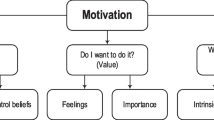Abstract
After a review of comparable degree productivity among several social and behavioral sciences, this paper concludes that sociology was uniquely affected by forces that lowered both the production of B.A.’s, M.A.’s, and Ph.D.’s and the quality of its graduate students. From the mid-1970s to the late 1980s, sociology suffered drastic declines in student numbers and quality. The increased careerism among students apparently accounts for a substantial portion of this decline, but through a very concrete mechanism: the expansion of business programs. The paper suggests that perhaps an absence of a serious commitment to teaching scientific sociology accounts for the loss of quality, since applied sciences have fared much better than has sociology. The recent ASA Task Force recommendations for curriculum redesign are reviewed, and a call is issued for revitalizing the scientific component of undergraduate sociology.
Similar content being viewed by others
References
Almond, Gabriel. 1991.A Discipline Divided: Schools and Sects in Political Science. Sage: Newbury Park, CA.
American Sociological Association: Task Force in Sociology. 1990.Liberal Learning and the Sociology Major: A Report to the Profession. Washington, D.C.: American Sociological Association.
American Sociological Association: Task Group on Graduate Education. 1992.Report of the ASA Task Group on Graduate Education. Washington, D.C.: American Sociological Association.
American Sociological Association. Annually.Guide to Graduate Departments. American Sociological Association: Washington, D.C.
Arons, A.B. 1993. “Uses of the Past: Reflections on United States Physics Curriculum Development, 1955 to 1990.”Interchange 24: 105–128.
Association of American Colleges. 1991.Liberal Learning and the Arts and Sciences Major, Vol. 2. Reports from the Fields: Project on Liberal Learning, Study-In-Depth, and the Arts and Sciences Major. Washington, D.C.: Association of American Colleges.
Baker, Paul, and Rau, William C. 1990. “The Cultural Contradictions of Teaching Sociology.” Ch. 11 in Herbert J. Gans, (Ed.),Sociology in America. Newbury Park, CA: Sage.
Bowen, William G., and Rudenstine, Neil L. 1992.In Pursuit of the Ph.D. Princeton, NJ: Princeton University Press.
Bowen, William, and Sosa, Julie Ann. 1989.Prospects for Faculty in the Arts & Sciences. Princeton, NJ: Princeton University Press.
Cappell, Charles, and Fritsma, Terri. 1993. “Survey of Undergraduate Majors.” Working Paper, Dekalb, IL: Dept. of Sociology, Northern Illinois University.
Cappell, C., and Guterbock, T. 1992. “Visible Colleges: The Social and Conceptual Structure of Sociology Specialties.”American Sociological Review 57: 266–273.
——— 1991. “The Structure of Co-Specialization in Sociology.” Department of Sociology. Northern Illinois University, DeKalb, IL. Unpublished manuscript.
——— 1986. “Dimensions of Association in Sociology: An Organizational Map of an Academic Discipline.”Bulletine Methodologie de Sociologie 9:23–39.
Collins, R. 1986. “Is 1980s Sociology in the Doldrums?”American Journal of Sociology 91: 1336–55.
D’Antonio, William V. 1992. “Recruiting Sociologists in a Time of Changing Opportunities.” Ch. 8 in Terence Halliday and Morris Janowitz (Eds.).Sociology and Its Publics. Chicago: University of Chicago Press.
DeFleur, Lois. 1992. “Strengthening the Position of Sociology within the University.”Footnotes 20: 3–4.
Educational Testing Service. 1991.GRE: 1991–92 Guide to the Use of the Graduate Record Examinations Program. Princeton, NJ: ETS.
Ennis, James G. 1992. “The Social Organization of Sociological Knowledge: Modeling the Intersection of Specialities.”American Sociological Review 57: 259–65.
Gans, Herbert. 1991. “Some Virtues of Sociology.”Footnotes 20: 4–5.
———. 1990. “Sociology in America.” Appendix B in Herbert J. Gans, (Ed.),Sociology in America. Newbury Park, CA: Sage.
Jones, Katharine, and Roos, Patricia. 1991. “The Feminization of Sociology?” Paper presented at the Annual Meeting, American Sociological Association, Cincinnati, OH.
King, Gary, Keohane, Robert O., and Verba, Sidney. 1994.Designing Social Inquiry: Scientific Inference in Qualitative Research. Princeton, NJ: Princeton University Press.
Ladd, E.C., Jr., and Lipset, S.M. 1976.The Divided Academy. New York: W.W. Norton and Co.
Larson, Magali Sarfatti. 1977.The Rise of Professionalism: A Sociological Analysis. Berkeley, CA: University of California Press.
Lauter, Paul. 1995. “‘Political Correctness’ and the Attack on American Colleges.” Pp. 73–90 in Michael Bérubé and Cary Nelson, (Eds.),Higher Education Under Fire. New York: Routledge.
Lynch, David, McFerron, J.R., Bowker, L., and Beckford, I.A.C. 1993. “A Discipline in Trouble: Why More Sociology Departments May Be Closing Shortly.”Footnotes 21: 3–5.
Miller, Jon. 1992.The Public Understanding of Science and Technology in the United States, 1990. Report to the National Science Foundation. Washington, D.C.: Division of Science Resource Studies, National Science Foundation.
Moffat, Anne. 1994. “Some Small Schools Are Big on Manufacturing Scientists: ButCaveat Emptor for Small Grad Schools.”Science 266:850.
Otten, Mike. 1992. “Creativity & Consensus: Building a Sociology Department.”Footnotes 20: 3.
Rau, William, and Baker, Paul. 1989. “The Organized Contradictions of Academe: Barriers Facing the Next Academic Revolution.”Teaching Sociology 17: 161–175.
Roos, Patricia, and Jones, Katherine. 1993. “Shifting Gender Boundaries: Women’s Inroads into Academic Sociology.” Unpublished manuscript.
Sullivan, Teresa. 1993. “Review of Sociology and Its Publics. T. Halliday and M. Janowitz, Eds. Chicago: University of Chicago Press.”Contemporary Sociology 22: 876–8.
Sykes, Charles J. 1988.Profscam: Professors and the Demise of Higher Education. New York: St. Martin’s Press.
Thurow, Lester. 1983.Dangerous Currents: The State of Economics. New York, NY: Random House.
Turner, Sarah, and Bowen, W. 1990. “The Flight from the Arts and Sciences: Trends in Degrees Conferred.”Science 250: 517–21.
Turner, S., and Turner, J. 1990.The Impossible Science: An Institutional Analysis of American Sociology. Newbury Park, CA: Sage.
U.S. Department of Education, 1992. Bi-annually and then annually.Digest of Education Statistics. “Degrees and Other Formal Awards Conferred.” Washington, D.C.
---. 1990.Digest of Education Statistics. “Higher Education: Outcomes.” Washington, D.C.
U.S. News & World Report. 1991, 1992, and 1993.America’s Best Colleges. (Oct.). N.Y.
Wagenaar, Theodore C. 1991. “Goals for the Discipline?”Teaching Sociology 19: 92–95.
White, Patricia E., and Lewis, Laurie. 1992.Survey on Undergraduate Education in Sociology. Higher Education Surveys Report, Survey # 15-Sociology. Washington, D.C.: National Science Foundation.
Author information
Authors and Affiliations
Rights and permissions
About this article
Cite this article
Cappell, C.L. An empirical comment on the state of sociology. Am Soc 26, 78–116 (1995). https://doi.org/10.1007/BF02692029
Issue Date:
DOI: https://doi.org/10.1007/BF02692029




